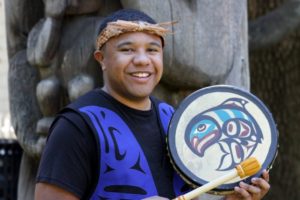Child wonder meets cultural traditions in Camosun alumnus Ren Louie’s second children’s book, Teachings of the Drum.
Based on his own life, the story teaches children about Indigenous drums and embracing cultural identity. A 2019 graduate of Camosun’s Indigenous Studies program, Louie says the book is also a personal reflection of his own cultural relationship.
“It’s still a true story about me and basically my upbringing and my cultural upbringing, and it all takes place here in Victoria, pretty much from, I would say, ’04 to ’07,” he says. “It’s a neat little story that allowed me to reflect on my childhood and all the people that made it special.”
Teachings of the Drum is similar in theme to his first book, Drum from the Heart, but there are a few notable differences in target demographic and writing style.
“The demographic for this one is ages four to six. So, it’s an adaptation of the original story and this one is a nice cozy read,” says Louie. “It’s a rhyming book and I think it kind of makes you feel warm and fuzzy on the inside. And we took a lot of inspiration from the work of Dr. Seuss and such, with a nice little story that ties the elements of the first story together, but for a younger audience, and kind of focuses on specific topics rather than all the topics covered in the first book.”
The book focuses on the practice of caring for one’s drum, however, to keep the teachings age appropriate, some concepts were left out.

“So, usually, you can warm a drum by the fire,” says Louie. “We specifically took that teaching out of this book because of the age category, 4 to 6, and just not wanting the young kid to either be working with fire or an oven or something. It was kind of the greater good of the decision to not share that teaching with such a young audience because generally speaking, we don’t tell kids about the fire at that age.”
Louie’s passion for storytelling extends beyond the genre of children’s books. He would like to someday teach at the post-secondary level.
“I love every aspect of our culture, but I specifically love the efforts of revitalization to storytelling. And I think if we could, if I could have a role teaching Indigenous stories, I think I would really enjoy that,” he says. “So, Indigenous literature is a huge passion of mine.”
There are more children’s books to look forward to from Louie—he says he has quite a few stories to share.
“We’re currently working on a story about a grandmother and a cedar tree,” he says. “And I don’t think I can share much more than that, but I think the good news is probably in the next year, this book should be, hopefully, on the shelf.”
In addition to writing children’s books, Louie brings Indigenous drumming into schools.
“I go to the classes, and I drum and sing with the kids. I read them my book and answer any questions they have, and they really enjoy it. And over the eight years [I’ve been doing this], I’ve seen a huge shift. Now… when I go to the classes, I just lead the songs, they know how to sing, and they know how to sing certain songs. And I think that’s wonderful.”
Louie’s message to aspiring writers has not changed over the years since his first book. He passes on the same advice Indigenous writer and activist Lee Maracle gave him.
“She said, to any Indigenous person who’s interested in reading or writing, the two words that she shared with me, and with anyone who has an interest, was ‘Get writing.’”
